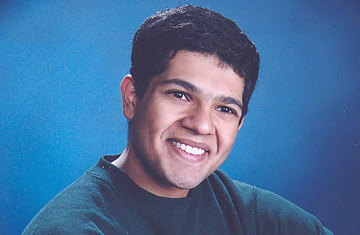
Rajiv Srinivasan, pictured during his high school years, learned a life-changing lesson on the morning of Sept. 11, 2001
On a Tuesday morning during my sophomore year of high school, a few friends and I stumbled into our morning math class in a raucous but musical mood. There was some running joke about us forming a boy band; my dark skin meant I was no doubt going to be the cool minority from the hood. I silently enjoyed how my Indian skin tone allowed me to emulate a range of stereotypes. Our laughter was stifled by the call to order by our instructor, Mr. Phil Sanders.
Each morning, Mr. Sanders picked a volunteer to lead the class in the Pledge of Allegiance. It seemed to be a ritual, and so that morning I used it as an opportunity to shine attention on myself — to impress my friends and make the pretty girls in class laugh. I raised my hand, and when Mr. Sanders called on me, I didn't recite the pledge. I chose to sing it — my way. I closed my eyes, bent at the knees and mixed the stylings of Steven Tyler and Justin Timberlake. I danced, I clapped. The whole class laughed. I smiled with the confidence of a class-clown hero.
Mr. Sanders put his hand in his pocket, grabbed a dry-erase marker, and for a second I thought things were normal. But I knew something was wrong when he began to write two names on the whiteboard: Major John de Larouse and Captain Frederick Armaday. "Look at these names. Both of these men were my friends. They each gave their lives in service to our country." I immediately remembered that Mr. Sanders was an Air Force Academy graduate. He had flown hundreds of combat missions in Vietnam. He told each of their stories. Major de Larouse was Mr. Sanders' classmate at the academy. His plane was shot down over Ho Chi Minh City. Captain Armaday was his roommate. His helicopter crashed in the attempt to evacuate an American casualty. In a painfully kind and compassionate tone, he asked, "When we say the pledge, think of all the people who have sacrificed their lives for your freedom. Be thankful for what this country gives you." The class remained silent. "All right, let's get to the lesson." And just like that, the moment was over and class went on. My eyes glazed over in shame.
In my self-absorbed adolescence, I remember being sorry for offending Mr. Sanders, but not for my theatrical desecration of the Pledge of Allegiance. I wasn't sorry for defiling a landmark of our nation's heritage, only that I did it in front of a war hero. I was more concerned about my friends thinking less of me than the implications the display had for my own character.
The period ended, and I floated down the hall toward our auditorium to begin a research project. I wondered if my singing the pledge would affect how Mr. Sanders would grade my test. I decided to make a deliberate effort to brownnose him for the next week. It was the last thought that crossed my mind before the school principal came on the loud speaker: "Ladies and gentlemen, a few moments ago, an airplane crashed into the World Trade Center in New York."
Until the second plane hit, few knew that a terrorist attack was under way. Most were still hoping it could have been a terrible air-traffic-control mistake. But, somehow, I didn't. I knew it was terrorism from the first moment. I knew it because what I did that morning had been something of a premonition. I had been reminded of war. I had been reminded too of tremendous patriotism and valor. And I wasn't worthy of any of it.
